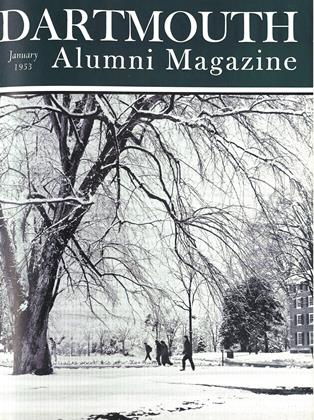THIS column is concerned with what, to us, was "the old crowd," and is written, admittedly, with an incompetent hand and an only partially informed mind. We are not here discussing the really old crowd, many of whom were active and aggressive even in our day. The paeans have oft been sung, by those who held that the College was out of hand when it jumped its enrollment to 1300, of the happy days of the origins of Delta Alpha, of Johnnie K. Lord, of Charlie Adams, Clothespins Richardson, Chuck Emerson, Gabe Campbell, Bubby Bartlett, James Colby, Johnnie Vose Hazen, Toot Worthen, Bobby Fletcher, Lemuel Hastings, and Harmony Morse.
We are here thinking, rather, of the up and coming young instructors and assistant professors of the first decade of our current ill-starred century. By our time, they were established pillars of the college community, teaching us, in the days when we were still eager to learn, better ways of thought and life than we have since encountered. Who of our era can forget the loving care that Harry Burton lavished on the beautiful word "amabimini"; the caustic and effective drilling in elementary French with Louis Dow; the excitement of ideas (for many of us the first) in Will Stewart's new courses in European Thought; the lectures in Archaeology that Georgie D. Lord conducted from Burpee's Seed Catalogue; the challenges to social intelligence by George Ray Wicker; the terrifying but salutary experience of a history class under Eric the Red; or the first dim taste of the beauty of literature with Freddy Emery in "Shakespeare" or "The Novel"?
In a slightly earlier era, these and others were relatively new arrivals on the Hanover scene, and formed their own intellectual oasis in a hide-bound community. At the time we ourselves were far removed, in a benighted locale, where we had never heard of Dartmouth or the Ernest Nichols-Gordon Hull experiment in weighing star beams, but were occupied with dating Georgia Neese long before she envisaged signing dollar bills or, indeed, before either of us had ever seen any big dough except an occasional silver dollar. Our present knowledge, therefore,
is from friendly hearsay and contains, no doubt, many sins of omission and commission.
"The Anarchists," for example, set themselves up in the 1900's to do their own thinking and talking. As far as recollection of conversations serves, they consisted originally of Dr. Gile, Will Stewart, Louis Dow, Ord Skinner, Bill Sheldon, George Ray Wicker, Cy Young and John Poor. Later young Ernest Hopkins, Elmer Carleton, and Red Greene joined in discussions and arguments that must have been exciting beyond the imagination of this present sociologico-psychologico-politico age.
Crying mea culpa for those inadvertently forgotten, we would add to the beloved list of this period the names of Dutchie Hardy, Dr. C. C. Stewart, Wah-Hoo-Wah Adams, Homer Keyes, Curtis Page, Gene Clark, Bill Gray, Francis Childs, Bill Murray, Bill Patton, Frank Dixon, Squirt Gerould, Craven Laycock, Bush Kingsford, all of whose names invoke an Arcadie that we would fain, except for final exams, have inhabited. The petites histoires of this group that we have most dearly cherished are not for presentation in this eminently family journal.
Later on we still had characters, some of whom persisted for a time even after the College swelled with insolence and might (we almost, and correctly, said "wine"). Jules Route, Grover Cleveland Loud, Cheerless Richardson, Birdie Lickleider, Leonard McWhood, Charles Minor Stearns, David Lambuth all put their individual stamp on the students in their classes or laboratories. The career of Leland Griggs, like that of John Poor, is a story in itself and cannot be adequately treated here. His shortcake parties, John Poor's "Tomcat Constant" (correlated with thermometric readings) and the general lore of Observatory Hill deserve a more skillful pen than ours.
Not long back a friend beloved for many years was recalling the time when her Lares and Penates were being moved from Main Street to a college apartment and, failing adequate cleaning help, had her husband enlist the aid of some of the freshmen in his classes. The service was freely and cheerfully given but, as we very unkindly pointed out, those freshmen are now in their sixties.
For the matter of that, it seems unlikely that any one of us is younger this year than he was in 1952.
 View Full Issue
View Full Issue
More From This Issue
-
 Article
ArticleFAITH and the Dilemma of the Educated Man
January 1953 By FRED BERTHOLD '45 -
 Class Notes
Class Notes1918
January 1953 By ERNEST H. EARLEY, DONALD L. BARR -
 Article
ArticleAn Investment In Young Men
January 1953 By ROY W. HATCH 02 -
 Class Notes
Class Notes1950
January 1953 By ENS. SCOTT C. OLIN, SIMOND J. MORAND III -
 Class Notes
Class Notes1928
January 1953 By OSMUN SKINNER, JOHN PHILLIPS -
 Class Notes
Class Notes1917
January 1953 By KARL W. KOENIGER, DONALD BROOKS
BILL McCARTER '19
-
 Article
ArticleNot So Long Ago .... Cry Havoc!
December 1933 By Bill McCarter '19 -
 Article
ArticleThe Hanover Scene
March 1953 By BILL McCARTER '19 -
 Article
ArticleThe Hanover Scene
July 1953 By BILL McCARTER '19 -
 Article
ArticleThe Hanover Scene
January 1954 By BILL McCARTER '19 -
 Article
ArticleTHE HANOVER SCENE
By BILL McCARTER '19 -
 Article
ArticleTHE HANOVER SCENE
APRIL 1959 By BILL MCCARTER '19







